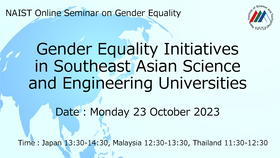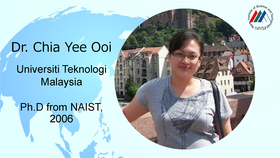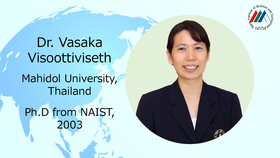2023/10/27
The Division of Information Science and the Gender Equality Office held an online seminar on gender equality, "Gender Equality Initiatives in Southeast Asian Science and Engineering Universities," on October 23, 2023.
We invited our alumni from the engineering faculties of universities in Malaysia and Thailand as guests, and they talkd about policies surrounding gender equality in both countries, support for balancing work and child rearing at universities, and efforts to nurture the next generation of science and engineering.
Dr. Ooi Chia Yee, Associate Professor at the Faculty of Digital Services, Universiti Teknologi Malaysia, explained that the number of female students entering engineering faculties in Malaysia has been increasing year by year to 36% (by 2022), supported by government policies, while the percentage of female faculty members is still low. However, the mentoring and coaching functions among faculty members have helped them to advance their careers.
Dr. Vasaka Visoottiviseth, Associate Professor, Department of Computer Science, Faculty of Information and Communication Technology, Mahidol University, Thailand, explained that in Thailand, educational programs are divided into Science and Math, Arts, and Arts-Math programs at the time of entering high school, and that the ratio of female students is 7 to 3 in the Arts-Math program. Dr. Vasaka also talked about how diversity in Thailand is fostered by the inclusion of the LGBTQ community, the standardization of dual-earner families, and the raising of children in big families.
During the discussion session, the themes were female student enrollment in science and technology and career advancement for female faculty members. The chair, Professor Okada, introduced the ratio of female students in the Division of Information Science (9.6% for master's course and 18.4% for doctoral course (by 2022)) and asked the two lecturers for advice on how to improve the ratio. The both guests commented that it would be effective for female graduate students to actively visit junior high schools and high schools and give mini-lectures, as role models for female junior high and high school students. When President Shiozaki asked Dr. Ooi about factors preventing female faculty members from advancing in their careers, Dr. Ooi responded that one of the difficulties for women is that they have to make many overseas business trips to be promoted. The President also mentioned that in Japan, the percentage of both male and female students who wish to enter in science and technology is low, on the other hand, 40% of the participants in the JST Next Generation Science and Technology Challenge Program NAIST STELLA, which started in 2023, were female students.







